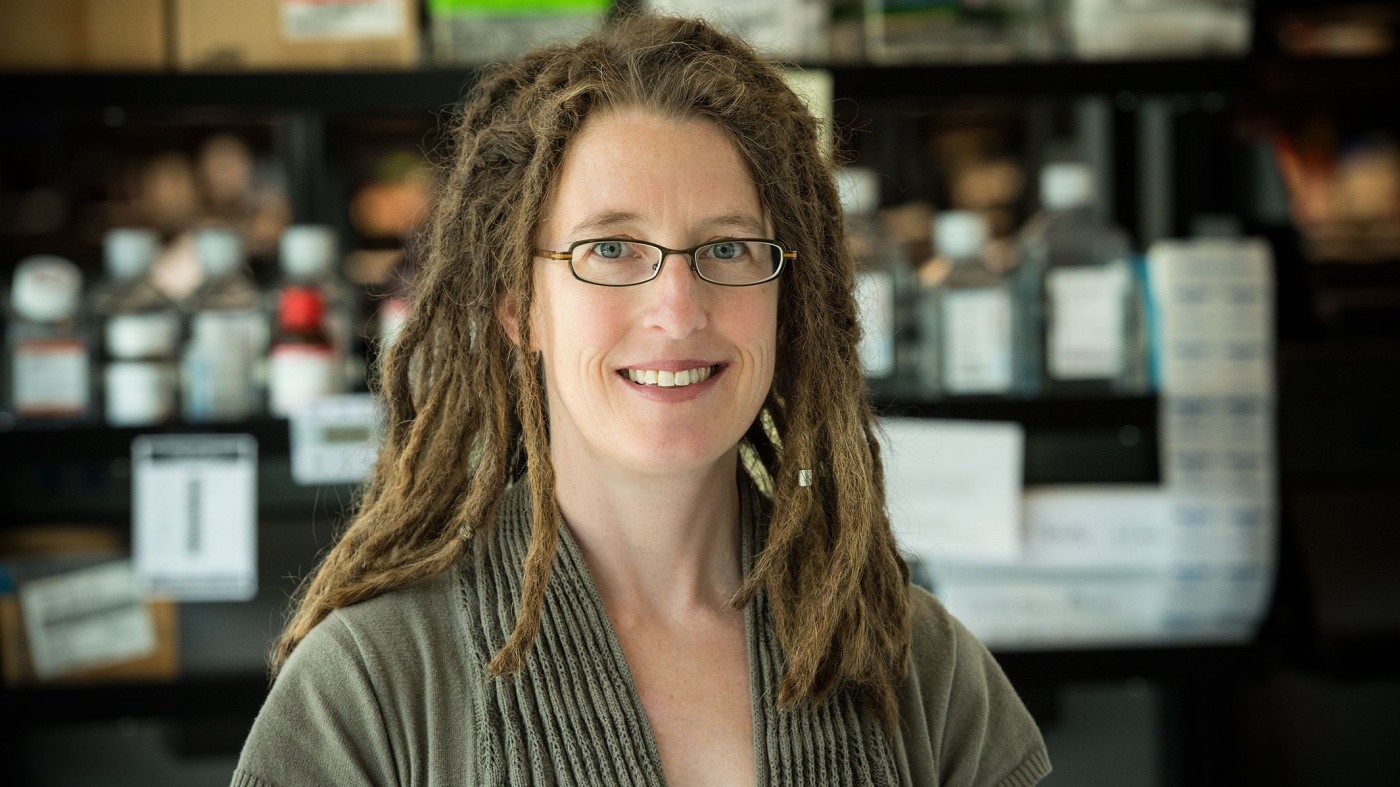Gladstone NOW: The Campaign Join Us on the Journey✕

The human microbiome plays a role in processes as diverse as body composition, immune function, and mental health. Katherine Pollard studies these microbes to learn how they influence health and disease. [Photo: Chris Goodfellow]
Cellularly and genetically, we are more “other” than human. The human microbiome—the diverse array of bacteria, yeast, parasites, and other single-celled organisms that live in and on our bodies—is comprised of more microbes than there are stars in the galaxy, and the genes encoded in microbiome DNA vastly outnumber our own genes.
Our microbiome is as unique to us as a fingerprint and plays a role in processes as diverse as body composition, immune function, and mental health. Our diet, external environment, antibiotic use, personal hygiene, where and how we were born, and proximity to animals all affect the microbiome, which can change from month to month or even from morning to night. Yet despite the importance of the microbiome, we are just beginning to uncover which microorganisms reside in our bodies and determine what functions they perform.
A New Initiative
These microbes—only 1% of which have been thoroughly studied—interact with one another and work with our own cells to create an ecosystem that is mutually beneficial. To decipher this complex network, my lab at the Gladstone Institutes is collaborating with researchers around the world to establish a Unified Microbiome Initiative (UMI) to catalog the microorganisms that live with us and assess how they relate to health.
However, simply categorizing the kinds and amounts of bacteria present in the body is not enough—the genetic make-up of each strain also needs to be decoded. The DNA within the same species of bacteria from two different human hosts can be wildly different. While the genomes of two humans may only vary by 0.1%, two strains of the same bacteria can differ by more than 50%—greater than the disparity between the genomes of humans and mice. What’s more, the variations in bacterial DNA are often important pieces that are involved in things like antibiotic resistance or the digestion of dietary fiber.
For example, one strain of the bacteria E. coli lives harmoniously in our intestines, where it protects us from harmful invaders. However, another strain of E. coli has several key gene changes that can cause severe food poisoning if it enters the gut. Thus, in order to link a person’s microbiome to body mass index (BMI) or disease, it is critical to know which genes are present and what role they play.
Making Sense of Big Data
My group’s research focuses on developing innovative technology and analytical methods to infer meaning from the staggering amounts of data 100 trillion organisms create.
Making sense of the thousands of bacterial strains and their millions of genes is no easy task. One person’s microbiome creates ten computers’ worth of information, meaning that data analysis, not collection, has become the bottleneck in research. Fortunately, my lab specializes in this type of Big Data analysis, and by using powerful computational tools, we can make sense of vast quantities of information.
Additionally, our advanced methods allow us to analyze the microbiome with more depth and precision than previously possible. For instance, we recently developed a computational shortcut to estimate total genome size using statistical modeling, enabling us to improve the accuracy of microbiome studies. This information is essential. Besides influencing the function of the microbiome, changes in bacterial genes also affect total genome size, which can bias the estimation of the proportion of each gene in the sample. The additional step of correcting for genome size has changed the conclusions of several previously published microbiome studies.
Debunking the Microbiome’s Role in Obesity
As an example, earlier research claimed to find a signature for obesity in the gut microbiome, stating that a certain type of bacteria called Firmicutes may be to blame for excess body fat. However, my lab believed these conclusions were over-simplified.
To test this, we reanalyzed the data from the original studies and several larger investigations of healthy individuals using our new methods. We found no significant relationship between BMI and the types of microbes in one’s gut. In fact, we revealed that lean participants from the different studies varied more in their levels of Firmicutes than did the lean and obese individuals within each study, pointing to systematic biases and biological differences across the study populations.
Rather than there being one type of bacteria that’s related to obesity, we think the microbiome mediates weight through its effect on metabolism, like how efficiently microbes help digest sugars and fats. Again, what matters is not the type of bacteria present in your gut, but what genes they have.
The Hygiene Hypothesis
The microbiome also plays a critical role in maintaining our immune system. The dramatic rise in conditions like asthma, autism, and inflammatory bowel disease (IBD) has been partially attributed to modern-day changes in our diet and environment that consequently influence the microbiome. This so-called “hygiene hypothesis” proposes that our clean lifestyle, use of antibiotics, and a diet high in processed food has caused us to lose touch with healthy components of our “ancestral” microbiome.
In support of this theory, my lab discovered that the Khoisan, a traditional hunter-gatherer population from Southern Africa, have dramatically different microbiomes than found in industrialized societies. They also have almost no trace of these types of immune disorders. Because the Khoisan have little or no access to antibiotics or dental care, their microbiome may be closer to our species’ ancestral microbiome, and may, therefore, offer clues as to how the presence or absence of particular microbe species could influence one’s risk for disease.
Stemming from this initial research, my lab is now investigating how changes in the microbiome contribute to the development of IBD in an animal model of the syndrome. We are also analyzing the gene content of hundreds of microbiome species from humans all over the world to test if the hypotheses we formed from the Khoisan study hold up. If so, we aim to pinpoint the microbial genes whose loss increases the risk of IBD and other autoimmune diseases.
Treating the Microbiome
Given the microbiome’s essential role in human health and disease, it is a natural place to turn when looking for cures. Augmenting the microbiome through fecal transplants (bacteriotherapy) is already a validated treatment for C. difficile colitis, a complication that can arise from antibiotic therapy. Colitis occurs when the balance of bacteria in the gut is disrupted, allowing the harmful C. difficile to replace normal gut flora. A fecal transplant replenishes the gut with healthy bacteria that may have been wiped out during prolonged antibiotic use.
A personalized medicine approach can also be considered. Microbes affect metabolism and absorption of medication, as well as risk for disease. Thus, it is conceivable that we might one day tailor an individual’s drug therapy based on their microbiome. This tactic is already being applied using a person’s genetic profile in conditions with a known genetic cause, like some forms of cancer.
Before a personalized approach is possible, we must gain a better understanding of which microorganisms share our bodies and why they are there. This is our challenge, but it is one that offers great promise. By learning the secrets of our “other” organ—the microbiome—we can use this knowledge to prevent, treat, and cure disease.
Katherine Pollard, PhD, is a Senior Investigator at the Gladstone Institutes. She is also the Director of the Gladstone Convergence Zone and a Professor of Epidemiology & Biostatistics at the University of California, San Francisco.
For more stories about Gladstone's cutting-edge biomedical research, visit our News & Highlights.
Want to Join the Team?
Our people are our most important asset. We offer a wide array of career opportunities both in our administrative offices and in our labs.
Explore CareersSix Gladstone Scientists Named Among World’s Most Highly Cited Researchers
Six Gladstone Scientists Named Among World’s Most Highly Cited Researchers
The featured scientists include global leaders in gene editing, data science, and immunology.
Awards News Release Corces Lab Doudna Lab Marson Lab Pollard Lab Ye LabScience in Seconds | Researchers Pinpoint Key Gene Behind Heart Defects in Down Syndrome
Science in Seconds | Researchers Pinpoint Key Gene Behind Heart Defects in Down Syndrome
In this video, Gladstone scientists share how they used stem cells, gene editing, and AI to identify a gene driving heart defects in Down syndrome—and how reducing its levels in mice restored normal heart development, offering hope for future treatments
Gladstone Experts Cardiovascular Disease Data Science and Biotechnology Pollard Lab Srivastava Lab AI Big Data CRISPR/Gene Editing Human Genetics Stem Cells/iPSCsScientists Pinpoint a Key Gene Behind Heart Defects in Down Syndrome
Scientists Pinpoint a Key Gene Behind Heart Defects in Down Syndrome
After decades of mystery, Gladstone researchers identify a gene that can derail heart formation—and show that fixing it prevents the problem in mice.
News Release Research (Publication) Congenital Heart Disease Cardiovascular Disease Pollard Lab Srivastava Lab AI CRISPR/Gene Editing Stem Cells/iPSCs




